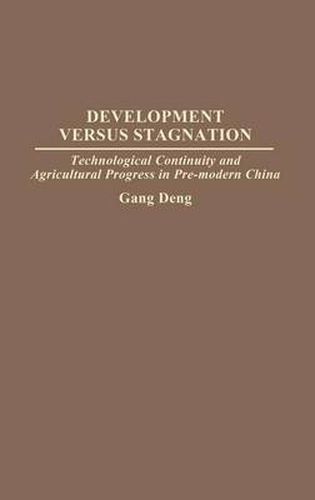Readings Newsletter
Become a Readings Member to make your shopping experience even easier.
Sign in or sign up for free!
You’re not far away from qualifying for FREE standard shipping within Australia
You’ve qualified for FREE standard shipping within Australia
The cart is loading…






China’s loss of economic, technical, and cultural supremacy after the Song Dynasty (AD 960-1279) has produced one of the greatest enigmas of world history. Why did China fail to undergo an industrial revolution? Explanations relate to deficiencies of Chinese cultural values, social structure, class system, bureaucracy and technology. This volume examines the subject of technological development, particularly agricultural development, in order to evaluate whether China suffered all-round technological stagnation. Using the example of the nongshu , or agricultural book, the author also examines the role of Chinese values, social structure, class structure and bureaucracy in the accumulation, preservation, diffusion, promotion and recovery of knowledge. Nongshu formed an organic part of Chinese agriculture and thus Chinese economic history. This examination of the nongshu phenomenon leads to new insights into the socio-political structure and long-term economic development of pre-modern China. This examination also shows that Chinese technology in argriculture, the leading sector of the economy, did not completely stagnate.
$9.00 standard shipping within Australia
FREE standard shipping within Australia for orders over $100.00
Express & International shipping calculated at checkout
China’s loss of economic, technical, and cultural supremacy after the Song Dynasty (AD 960-1279) has produced one of the greatest enigmas of world history. Why did China fail to undergo an industrial revolution? Explanations relate to deficiencies of Chinese cultural values, social structure, class system, bureaucracy and technology. This volume examines the subject of technological development, particularly agricultural development, in order to evaluate whether China suffered all-round technological stagnation. Using the example of the nongshu , or agricultural book, the author also examines the role of Chinese values, social structure, class structure and bureaucracy in the accumulation, preservation, diffusion, promotion and recovery of knowledge. Nongshu formed an organic part of Chinese agriculture and thus Chinese economic history. This examination of the nongshu phenomenon leads to new insights into the socio-political structure and long-term economic development of pre-modern China. This examination also shows that Chinese technology in argriculture, the leading sector of the economy, did not completely stagnate.